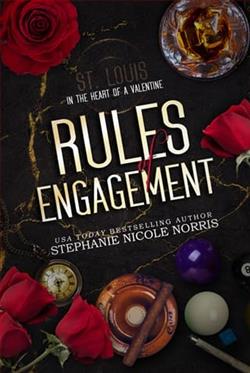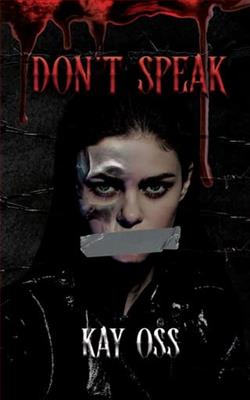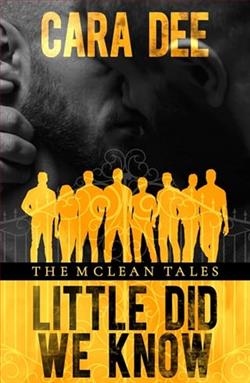Page 12 of Aubade Rising
I stop sweeping up the debris and turn to face her. “I don’t understand?”
“Watch.” She closes her eyes and a wave of serenity encompasses her features. A ball of water materialises between her outstretched hands. It’s large and as I peer closer, instead of being solid like the acorn of power I house, hers resembles a ball of watery yarn. Each strand of magic is carefully constructed and woven together, the ball of magic spinning lazily.
My mouth drops open at the sight. It’s beautiful, seeing pure Mordros magic calmly rotating in front of me.
Dervla barely moves, keeping her eyes closed, her posture relaxed. “Everyone in the Mordros is trained in it from birth. It’s called the Gallos, which means control. Without it, we would have no way of managing all of our power.”
“Then why have I never heard of it?” My eyes are glued to the ball of magic in front of me.
“It’s not common knowledge. We learn it as children and it becomes as instinctive as breathing. The threads are a basic building block of magic. We can layer them when we need to wield more but they remain as strands inside us, ready to be employed when needed. I think that’s what you should be doing, gradually building up the magic, instead of blasting it.”
“Another Mordros secret.” I sound bitter, ignoring the glimmer of excitement her suggestion creates.
“Yes, I suppose.” She’s not apologetic, just matter of fact. The ball of magic makes a final rotation then fades into her hands.
“Most of the Mordros prefer to home school their children; knowledge like this is passed down so I don’t think it would occur to anyone to share it.”
I can’t halt the sneer which flits across my face, forbidden knowledge striking a nerve.
Dervla rolls her eyes, exasperated. “Yes of course it’s because the Mordros are superior. Nothing to do with preventing children with access to that much magic being allowed to run around unsupervised.” Icy sarcasm drips from every word.
“I’m sorry,” I reply. I guess incorrect assumptions are irritating to everyone. I return to cleaning but Dervla surprises me: she picks up a broom and starts to sweep.
Chapter 11
The handwriting on the letter sitting on my desk is vaguely familiar. I’d ignored it initially, assuming it was a petition to support one of the aspiring Mordros families in whatever endeavour currently held their interest. The volume of requests increases each day, a clear response to being unable to corner me in the dining hall or elsewhere in the palace. Between my laboratory, the palace library, compulsory Concord meetings and sheltering in my rooms once the sky turns dark, I’ve avoided all interactions.
I open the letter and my heart drops at the signature and name neatly printed at the bottom: Cedar Dewnam. My older brother. We’ve been estranged since our parents were swept out to sea in a flash flood a decade ago. We argued before I left to study in Athnavar and haven’t spoken since.
Our parents came from small families and met when they were young. By the time they had children, they were the only family each other had. Our father cleaned Pentargon’s streets and our mother dreamed of working as an assistant in a school.
Being Aubade in a kingdom ruled by the Mordros made life difficult. With our magic suppressed and our numbers dwindling, earning a living was hard. Most Aubades make the most of the little sunlight Trevesiga receives, so tend to stick to farming or outside work, very little of which can be found in a city. Steady, reliable employment and opportunities to improve oneself are rare.
Escape, for me, came in the form of studying. Our mother believed in the possibilities from a good education, even for an Aubade. I had to commit to studying to keep up with otherchildren whose parents hired the best tutors money could buy. All that studying meant Cedar and I weren’t close. My only focus was to excel so my magical ability, or lack of, would be disregarded. But only Athnavar Academy was willing to accept an Aubade and I bitterly compromised at this second-rate Academy. My test scores were exemplary but the admissions’ scholars were blinded by prejudice. I vowed to be exceptional and when the offer to move back to Pentargon came earlier this year, I knew I’d made it.
My parents were overjoyed and I made plans to leave that summer after I turned eighteen.
When our parents died in the flash flood as my mother walked my father home from work, my brother wanted me to give up my place in Athnavar and stay in Pentargon. Family should remain together, he said. But I couldn’t see a future where I stayed and became a street cleaner like him and my father.
Our arguments escalated, cruel words thrown by both sides and eventually I accused him of being selfish and left. Part of me was angry that he couldn’t support me after I’d worked so hard; the other part was relieved to have an excuse to leave the city and its memories. I felt guilty that he didn’t have the same.
I clutch the letter tightly in my pocket, protecting it from the mizzle as I walk through the grounds of Chi An Mor, towards the palace quay.
Chi An Mor is separated from the city by a bend of the River Targon. Growing up, I’ve seen ferries transport people back and forth, but I’ve never stood on this side of the movable, floating quay before. The gentle rocking conflicts with the ominous creaking from the wooden planks as I tread across them.
It occurs to me if the city was under attack, the palace quay could be disassembled quickly and no one would be able to seek sanctuary there. Chi An Mor is a fortress, but an isolated one.
The small crossing to the city feels hazardous. The ferrymanguides the ferry with skill against the strong gusts that try to tip us into the water. The skiffs provide little shelter and the incessant wind drives salt spray over the gunwale where it blisters against my exposed skin.
I gratefully accept the outstretched hand of the ferryman and place my feet on firm ground. My legs are steady but my hands tremble. No one notices my arrival; the harbour docks are busy with fishermen unloading their catch and with travellers queuing to embark on large ferries that will take them around the coast to Porth and other cities in Trevesiga. The salt crusts on my cheeks, mixing with tears that I blink away. I force myself to move, to hurry through the busy crowds, away from the slipways where my parents perished.
Leaving the harbour gates behind, the city and the constant smell of the ocean beckons me home. So much remains the same and the tension in my shoulders loosens. Bleached bunting connects each side of the cobbled streets; food carts clatter along the causeway, empty after a successful day. Recognition shadows my footsteps as I encounter familiar marketplaces, familiar streets.
The city is a calamitous mix of experimental building styles, which strive to withstand the winter gales and sharp sea air. Algae grows on the wooden structures, sea salt splits stone in two. Nothing is untouched by the sea in Pentargon. In late winter, it’s every structure for itself, gripping the ground to withstand the violent season. If the buildings survive past the spring floods, the focus will be on repairing before winter comes again. It’s a vicious and constant battle with the unforgiving sea.
I knock on the door and it’s opened promptly by a face so similar to mine that I take a moment to adjust.
“You came.” Cedar exhales loudly and welcomes me home. He looks like our father, autumn red hair, a sprinkling of white in his stubble and light grey eyes that match mine.















